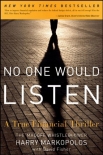No One Would Listen: A True Financial Thriller by Harry Markopolos (rainbow fish read aloud .txt) 📗

- Author: Harry Markopolos
Book online «No One Would Listen: A True Financial Thriller by Harry Markopolos (rainbow fish read aloud .txt) 📗». Author Harry Markopolos
General Cook had a low tolerance for bullshit. He always wanted to know the bad news, not the good news, and knew that he could determine the quality of his officers not by speaking with them, but rather by questioning the troops they commanded. Among the many things I learned from my military career that would prove invaluable during this investigation were persistence, human-based information-gathering techniques, interviewing skills, and the ability to maintain my composure.
We began by snooping. There are basically three ways to collect information in the financial industry. First, you can collect the publicly available information, including promotional literature, the pitch books firms distribute to create business, and everything on their web sites. I took everything off Madoff’s web site, although there wasn’t much of value. Second, you can buy data from numerous sources that will provide you with whatever type of esoteric information you want. Everyone has access to this information. And third, as I’d taught Neil, you can get the truly vital information by talking to people, by listening carefully to the rumors and the gossip, the boasting and the complaining. We took all three routes. Once we started working with Access, which was a large feeder fund to Madoff, we got a complete look at all its data. Frank Casey would collect material from his prospects, telling them, “I’m interested in placing money with Madoff,” and if we wanted something specific from a fund, my brother Louie would call and explain, “I’ve got a client who’s interested in getting into Madoff. Can you help me?”
Talking to Wall Street people was extremely informative. Most of these people I was talking with during the normal course of Rampart business, but whenever I had an opportunity I would ask a few questions about Madoff. I spoke with the heads of research, traders on derivatives desks, portfolio managers, and investors. Neil was doing the same thing, and both of us were doing it secretly, because if our bosses found out about it they would have demanded that we stop.
Probably what surprised me most was how many people knew Madoff was a fraud. Years later, after his surrender, the question most often asked would be: How could so many smart people not have known? How could he have fooled the brightest people in the business for so long? The answer, as I found out rather quickly, was that he didn’t. The fact that there was something strange going on with Bernie Madoff’s ’s operation was not a secret on Wall Street. As soon as I started asking questions, I discovered that people had been questioning Madoff’s claims for a long time; but even those people who had questioned his strategy had accepted his nonsensical explanations-as long as the returns kept rolling in.
The response I heard most often from people at the funds was that his returns were accurate—but he was generating them illegally from front-running. By paying for order flow for his broker-dealer firm, he had unique access to market information. He knew what stocks were going to move up, and that enabled him to fill his basket with them at a low price and then resell them to his brokerage clients at a higher price. Several people confided in me that they didn’t really know what he was doing, then point out that no one else on Wall Street had access to the quality of information he had, and no one generated the consistent returns he did. When those two facts were considered together, it seemed to make a strong argument that he was using his customer order flow to subsidize his hedge fund. Neil, who had done some analysis of payment for order flow when studying for his master’s in finance, believed it could truly provide Madoff an edge—but certainly not enough of an edge to generate the types of returns he was delivering.
There were at least some people who told Neil and me, confidentially of course, that Madoff was using the hedge fund as a vehicle for borrowing money from investors. According to these people, Madoff was making substantially more on his trading than the 1 to 2 percent monthly that he was paying in returns, so that payout was simply his cost of obtaining the money. These were sophisticated financial people. When I heard something like this, I just shook my head and wondered if they actually believed what they were saying. There was no reason Madoff would have to pay 12 percent interest—there were many other ways he could have gotten money at a lower cost. The only sensible explanation for this scenario was that he couldn’t risk having one of the rating agencies—Moody’s Investors Service or Standard & Poor’s, for example—come in and look





Comments (0)